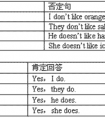动词填空。1. Betty hopes _____ (be) a singer and travel around the world.2. Millie decided _____ (not stay) at home.3. _____ (take) a bus is much faster tha-八年级英语
题文
| 动词填空。 1. Betty hopes _____ (be) a singer and travel around the world. 2. Millie decided _____ (not stay) at home. 3. _____ (take) a bus is much faster than riding. 4. Thanks for _____ (agree)to let me go on the trip today. 5. Wait here for a moment, I _____ (return) in a minute. |
答案
| 1. to be 2. not to stay 3. Taking 4. agreeing 5. will return |
据专家权威分析,试题“动词填空。1. Betty hopes _____ (be) a singer and travel aro..”主要考查你对 不定式,动名词,一般将来时 等考点的理解。关于这些考点的“档案”如下:
不定式动名词一般将来时
考点名称:不定式
- 动词不定式:
指由to加上动词原形(而且只能是动词原形)所构成的一种非限定性动词,但在有些情况下to可以省略。
动词不定式在语法功能上可作主语、宾语、宾语补足语、表语、定语和状语。 - 动词不定式可以作以上各种成分,但它毕竟是动词,所以有动词的属性。
动词不定式及其短语还可以有自己的宾语、状语,虽然动词不定式在语法上没有表面上的直接主语,但它表达的意义是动作,这一动作一定由使动者发出。
这一使动者我们称之为逻辑主语,其形式如下:
时态 主动形式 被动形式 一般式 (not) to do (not) to be done 完成式 (not) to have done (not) to have been done 进行式 (not) to be doing 完成进行式 (not) to have been doing - 不定式的用法:
1、不定式作主语
例如:To remember this is very important.
注意:为了避免头重脚轻,在许多情况下,通常都将作主语的不定式置于句子后部,而在句首主语位置使用形式主语it。
例如:It is very important to remember this.
2、不定式作表语
例如:He seems to be ill.
注意:不定式作表语主要有三种情况,一是用于seem, appear, prove等系动词之后的不 定式(尤其是to be),
二是像My job is to sweep the floor. 这样的主语与表语“等价”的情形,
三是表示想法、约定、义务、命令、可能性、命运等,如:
You are to come when I call.
3、不定式作宾语
例如:I can not afford to buy a car.
注意:
①不定式不仅用作动词的宾语,还可用作个别介词(but, except)的宾语。
例如:I had no choice but to wait.
②当作宾语的不定式后跟有宾语补足语时,通常要用形式宾语it代替不定式,并将真正的宾语不定式置于宾语补足语之后
例如:I find it difficult to learn Japanese well.
4、不定式作宾语补足语
例如:Who taught you to drive?
5、不定式作定语
例如:I have a question to ask you.
注意:有的名词(如way, chance, right等)后用作不定式可换成of doing sth.
如:It is the best way to do (of doing) it.
但是以下名词后接不定式作定语时通常不能换成of doing sth.
attempt courage decision effort fortune failure invitation wish
6、不定式作状语
例如:I went to France to learn French.
考点名称:动名词
- 动名词:
如果一个动词加上了ing变成了名词,那么这个词称动名词。 动名词是一种兼有动词和名词特征的非限定动词。
它可以支配宾语,也能被副词修饰。
由于动名词是由动词变化而来,它仍保留着动词的某些特征,具有动词的某些变化形式,用以表达名词所不能表达的较为复杂的意念。
动名词的名词特征表现在它可在句子中当名词来用,作主语、宾语、表语、定语。 动名词的结构和形式:
动名词的否定结构:
动名词的否定结构由not 动名词组成。如:
Trying without success is better than not trying at all. 实验没有成功也比不实验好。
He hated himself for not having work hard. 他悔恨自己没有用功。
I’m sorry for not having telephoned you before. 很抱歉,没有早给你打电话。
He felt sorry for not having done the work well. 他为没有把工作做好感到难过。
I fancy it has done you a lot of good not going. 我看不去对你倒好了。
(not going 是动名词一般式的否定形式)
There is no denying the fact that he si diligent.
(no denying 也是动名词一般式的否定)动名词复合结构:
通常情况下,动名词的逻辑主语为谓语动词的主语。如果动名词动作的发出者不失谓语动的主语时,则需要有自己的逻辑主语物主代词或名词所有格加动名词就构成了动名词的复合结构,这种结构在句中可以作主语,宾语等。
(1)逻辑主语是有生命的名词作主语时,必须用名词或代词所有格,作宾语时(尤其在口语中),也可用名词普通个或人称代词宾格。如:
Do you think my going there will be of any help?
你看我去会有什么帮助吗?(宾语)
The student’s knowing English well helps him in learning French.
这位学生通晓英语对他学法语很有帮助。(主语)
Do you mind my(me) smoking ? 你介意我抽烟吗?(宾语)
They insist on Mary’s (Mary) going with them there.
他们坚持要玛丽跟他们一起去那儿。(介词宾语)
(2)逻辑主语是无生命名词是,通常只用名词普通格。如:
Do you hear the rain pattering on the roof?
你听见雨点打在屋顶上了吗?
Is there any hope of our team winning the match ?
我们对赢得比赛有希望吗?
(3) 逻辑主语是指示代词或不定代词this that , somebody , someone , nobody, none, anybody, anyone 时,只用普通格。如:
She was woken up by somebody shouting outside.
她被外面喊叫的人吵醒了。动名词的形式(一般式,完成式和被动式):
(1) 动名词的一般式所表示的动作与谓语动词所表示的动作同时发生,或在谓语动词表示的动作之后。如:
We are very interested in collecting stamps. 我们对集邮很感兴趣。
His coming will be of great help to us . 他来对我们大有帮助。
但是有些明确表示时间的动词和介词 after, on,upon, 或for之后,常用一般式代替完成式,表示动作发生在谓语动作之前。如:
I shall never forget seeing the Great Wall for the first time.我永远不会忘记第一次看到长城的情景。
On hearing that bad news , the mother couldn’t help crying. 一听到这个糟糕的消息,母亲就禁不住哭了起来。
Excuse me for coming late. 我来晚了,请原谅。
Thank you for giving us so much help. 谢谢你给了我们这么多帮助。
(2) 动名词的完成式所表示的动作或状态在谓语动词之前完成或结束。
He regrets not having taken part in the work. 他后悔没有参加这项工作。
We were praised for having finished the work ahead of time. 我们因提前完成了这项工作而受到了表扬。
(3)动名词的被动式:当动名词的逻辑主语是行为承受者时,用被动语态。如:
- 最新内容
- 相关内容
- 网友推荐
- 图文推荐
| [家长教育] 孩子为什么会和父母感情疏离? (2019-07-14) |
| [教师分享] 给远方姐姐的一封信 (2018-11-07) |
| [教师分享] 伸缩门 (2018-11-07) |
| [教师分享] 回家乡 (2018-11-07) |
| [教师分享] 是风味也是人间 (2018-11-07) |
| [教师分享] 一句格言的启示 (2018-11-07) |
| [教师分享] 无规矩不成方圆 (2018-11-07) |
| [教师分享] 第十届全国教育名家论坛有感(二) (2018-11-07) |
| [教师分享] 贪玩的小狗 (2018-11-07) |
| [教师分享] 未命名文章 (2018-11-07) |


![Sunday is my birthday. I would like _____ a birthday party, would you _____to my party? [ ]A. have; come B. to have; to come C. have; to come D. to have-七年级英语](http://www.00-edu.com/d/file/ks/4/2/budingshi/2020-01-08/smalla85122db0c71d7fb6ae58187be7f1fd11578430330.png)

![Why areyou here? You are supposed ______ in the classroom now. [ ] A. to studyB. to be studiedC. studying D. to be studying -九年级英语](http://www.00-edu.com/d/file/ks/4/2/budingshi/2020-01-08/small6dee02daa62cac1c71853ac804ab4fbd1578422460.png)
![She is very poor. Little food _____ and no room _____! [ ]A. to eat, to live B. to eat, to live in C. eating, living -八年级英语](http://www.00-edu.com/d/file/ks/4/2/budingshi/2020-01-09/small17b77c2697a3ef8f1461d0d14b016ee51578585185.png)
